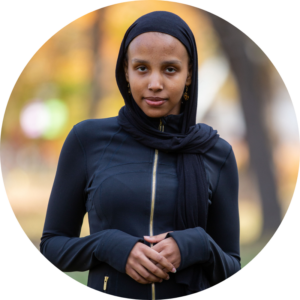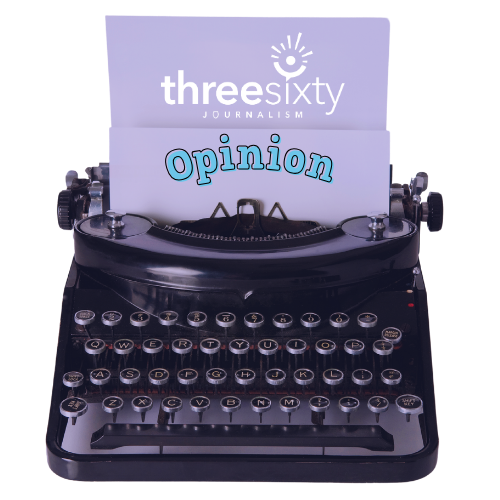 Suado Omar is a senior at Central High School in Saint Paul
Suado Omar is a senior at Central High School in Saint Paul
By Suado Omar
It was the peak of my puberty; I was experiencing uncomfortable changes. My anxiety presented itself in an unexpected way. The first thing I do is confide in my safe place: my mom. I talked to her about my anxiety; however, she didn’t understand. She had a confused, angry look on her face as if she was offended.
She had a similar reaction to finding out about my brother’s autism. He was diagnosed around kindergarten. She asked me not to tell anyone, including my siblings–as if having autism is a shameful thing.
I’m a senior at Central High School now. I’ve since learned I’m not the only one in my family who struggles with mental health. My sister, who I confide in, struggles with extreme anxiety as well. I’m sad about it, but simultaneously thankful to have someone older I can talk and relate to. Yet this made me wonder, how many other young Somalis are missing out on the help they need?
Eighty to ninety percent of Somalis in Somalia with mental health issues don’t have good affordable options to mental health resources, according to a qualitative study published by Tropical Medicine and Health Journal.
Many of our Somali parents were affected by the 1990 civil war. The aftermath has not been easier either; for decades, Somalia has faced economic and political turmoil. Trauma from multiple wars and humanitarian crises increase the risk of mental health issues.
Hearing what my parents and many other parents went through, I can understand their reaction. I don’t carry animosity towards them for not being open about our issues. Instead, it created the opportunity for me to educate them and speak out about such topics.
Somali parents are unaware of mental issues, such as autism. In a recent National Library of Medicine study, researchers exploring the knowledge of autism among Somali immigrants and non-immigrants found that Somali doctors don’t have enough competence in diagnosing autism. They also found that parents in Somalia had never heard the term “autism.”
Many of our Somali parents and elders never had resources for autism nor mental health issues. They are unaware of these concepts and of where to get help. They are unintentionally neglecting and misinforming their youth.
My peers at Central High School know firsthand what it’s like to have parents who don’t understand mental health. Amran Yarrow, a Somali American senior said, “I struggled with telling my parents my problems because they never had been in my situation, and they don’t understand the concept.”
Somali elders also have a stigma against those with autism. “They think it’s a joke and not important, and are often seen as someone acting up,” Makdis Aidid, a Central High senior said.
Misconceptions about autism can be detrimental to the overall health of our community. Rumors spread easily in the diaspora, particularly around the measles vaccine’s link to autism. Measles cases are reported year-round in Somalia where it is endemic. In 2022, the World Health Organization conducted an epidemiological study on measles outbreaks. In just 9 weeks, there were approximately 3509 cases across 18 regions. Not only does this rumor spread misinformation to our relatives back home, but it also causes panic, and fear of necessary medicine.
Many Somali parents use the Quran for spiritual treatment of autism. The NLM study reported a majority of the 22 parents surveyed sought faith-based treatment. As most Somalis are Muslim, we strongly believe the Quran can help with anything including Quran saar. In Somali, meaning “putting Quran on someone,” usually for Islamic exorcism.
“Since being in a religious environment, I have come across many kids with disabilities,” Abdullahi Abdullahi said. Abdullahi is a Central High School senior who works at a religious institute. He understands that the help they deserve is beyond religious treatment.
“We try to make the environment as friendly as possible, and we try our best to help them understand the religion. If not, then we take care of them and give them the special needs they deserve.”
It’s refreshing to see youth with modern perspectives on mental health and disabilities working in religious institutions. However, as a Muslim, I believe religious leaders should redirect parents to mental health and disability resources.
Healing spiritually is extremely important, but this is not a spiritual issue. Just using faith-based treatments isn’t addressing the full-depth of the problem. Youth aren’t getting the full extent of help they deserve. And religious leaders should take accountability for that gap.
The Sahan Journal recently covered the inaugural Maangaar summit in Bloomington, an event organized by Somali parents, professionals, and service providers to address the challenges faced by Somali families with children of autism. As an older sister to a little brother with autism, I related to a common struggle many shared: the pressure of being instructed to not tell anyone about your sibling’s autism. But I also felt inspired that fellow Somalis were trying to accomplish the same goal of spreading awareness for change.
My little brother may have been struggling in his education due to his disability, but it helped him tap into his creative side. He loves to draw both on paper and digitally. Autism is not a bad thing. It makes him unapologetically him and I wouldn’t want that to change.
I’m grateful that the barriers of unawareness and stigma have been shattered in my own household. But I wish for it to be shattered for others as well, those in the Somali community and far beyond.
Many Somali students at Central High School are in support of my cause and wish to share their voice. Najimo Ahmed Bare, a senior at Central, has had challenges with her mental health and supports those struggling with mental health and disabilities.
“Organizations [should] gather people with the same mental health issues and disabilities, so no one feels left out,” Bare said.
Youth should continue to use their voice for good. I work for an organization called Helping Hand Care as a personal care assistant and work with children who have autism. It would be amazing if we could have more of these organizations like Najma hopes for.
But overall, the most need is for the elders of the Somali community to be aware and more involved. This would alleviate my biggest fear: generational stigma.
It’s been a while since my brother was first diagnosed with autism. He’s in third grade now and soon to be 9. He has become a genius in art, even learning how to animate on his own and starting his own YouTube channel reaching over 100 subscribers. His autism may be his “disability,” but I consider it his gift.

Suado worked with Sahan Journal News Editor Trisha Collopy and Sahan Journal Reporter and ThreeSixty alum Katelyn Vue to complete her story. This story was produced as part of ThreeSixty Journalism’s 2024 Op-Ed Workshop for high school youth in partnership with Sahan Journal and the Minnesota Star Tribune.
